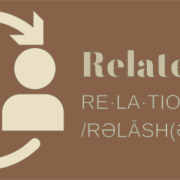Relate: Being Prepared for Relationship – Day 5
John Maxwell in his book Winning With People quotes Stanley C. Allyn saying, “The most useful person in the world today is the man or woman who knows how to get along with other people.” Wow! Relationship is all about knowing how to “get along with people.”
Relationally Challenged
Maxwell goes on to say, “Let’s face it. Not everyone has the skills to initiate, build, and sustain good, healthy relationships. Many people grow up in dysfunctional households and never have positive relationships modeled for them. Some people are so focused on themselves and their needs that others might not even exist. Still others have been hurt so badly in the past that they see the whole world through the filter of their pain. And because of the huge relational blind spots, they don’t know themselves or how to relate to people in a healthy way.”
He concludes by saying, “It takes relationally healthy people to build great relationships.”
What does it mean to be a relationally healthy person?
Relational Health
The Bible has more to say about relationships than we can imagine. Some of it is said directly. And some of it is said indirectly through the examples and stories.
Even when relational health isn’t fully in your control there are things you can do. Romans 12:18 says, 18 If it is possible, as far as it depends on you, live at peace with everyone. “As far as it depends on you” is helpful to remember. We can only do what we can do and when we have done all that we can do we can commit the rest to God through prayer. In fact, prayer can precede our actions and it can cover us after we have done what we can do.
We can only do what we can do. So, it’s helpful to ask, “What can we do to be relationally healthy? Consider what Paul says in Romans 12.
Romans 12:3–5 (NIV)
3 For by the grace given me I say to every one of you: Do not think of yourself more highly than you ought, but rather think of yourself with sober judgment, in accordance with the faith God has distributed to each of you. 4 For just as each of us has one body with many members, and these members do not all have the same function, 5 so in Christ we, though many, form one body, and each member belongs to all the others.
In recent years there has been a surplus of books about relational and emotional intelligence. Most of the books are business books. The Bible talked about this subject a long time before these books did.
The Humility Factor

“…rather think of yourself with sober judgment.” The New International Version. (2011). (Ro 12:3). Grand Rapids, MI: Zondervan.
Humility is the key factor to relational health. Humility is the ability to see yourself as you really are, “a person in need of God’s grace and leading.” Humility allows you to be gentle with others. And it allows you to see your strengths and weaknesses clearly. Where you are strong others may be weak. And where you are weak, others may be strong.
Paul reminds us that we are part of a body and there are a lot of other people in that same body. He is, of course, referring to the church, but we can extend that to the larger arena of life. You are one person in the workplace you are in, one person in a community, one person in a family. There are others in those same places. And all of us have different gifts and responsibilities.
What are your gifts and responsibilities? Use them and do them to the glory of God. And then let other people be who they should be and do what they should do. Sure, they may drop the ball. And yes, it might affect you. Humility reminds you that you drop the ball too. It also reminds you to ask for help when you need it.
Application
1. In what way do you think of yourself more highly than you ought? (3)
2. What does humility look like for you and in your relationships? (3)
3. What strengths, talents, and gifts do you have that help you serve others?
4. What weaknesses do you have and how can you let other people serve you in them?
Philippians 4:8 (NIV)
8 Finally, brothers and sisters, whatever is true, whatever is noble, whatever is right, whatever is pure, whatever is lovely, whatever is admirable—if anything is excellent or praiseworthy—think about such things.




